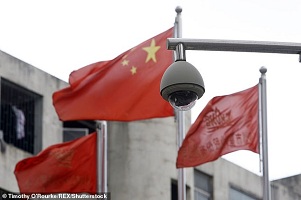Beijing is on track to have one CCTV camera for nearly every two people as the Communist Party pushes for Big-Brother-style state surveillance. The country’s 1.4 billion population are set to be carefully watched by 626 million street monitors – many having facial-recognition functions – as early as next year, a new study has revealed.
China also has five most-monitored cities in the world, the report finds. Its most-surveilled city, Chongqing, is equipped with more than 2.5 million street cameras, or one for every six people. According to the report, the world’s five most monitored cities are Chongqing, Shenzhen, Shanghai, Tianjin and Ji’nan in order. Three other Chinese cities – Wuhan, Guangzhou and Beijing – have made it to the top 10 list published by technology research firm Comparitech.
In Shenzhen, a city with 12 million residents, there is one street camera for every 6.3 people. The city, which borders Hong Kong, plans to have more than 16 million cameras installed in the coming years. The figure is a 1,145 per cent increase on the approximately 1.9 million cameras the city has today, the report claims. In the country’s financial heart, Shanghai, every 8.8 residents are watched by one security camera.
Paul Bischoff, author of the paper, said, “China is rapidly adopting CCTV surveillance as a means to monitor the movements of its population at a huge scale. ‘CCTV in China is not just about stopping crime, but also enforcing social norms and behaviors that the government approves of.”
The two other cities on the top 10 list are London, with more than 627 million cameras, and Atlanta in the United States. China has been building a mass surveillance network, which currently boasts about 200 million AI-powered cameras. The number of cameras is set to triple by 2020. The surveillance network has been billed as the world’s most powerful facial-recognition system and aims to identify any one of its 1.4 billion citizens within three seconds. Critics, however, have voiced concerns over the system, claiming it’s a way for the government to invade citizens’ privacy and restrict their freedom.








